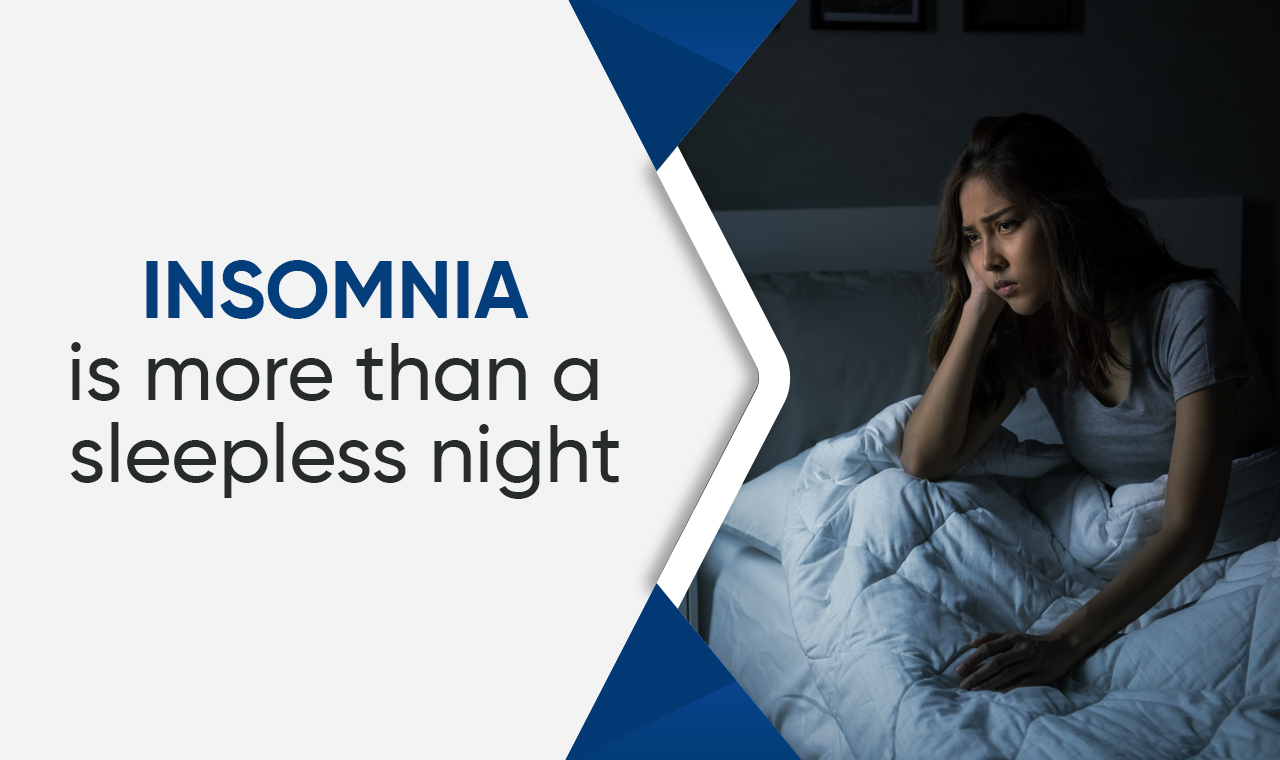Insomnia is a sleep disorder identified by the trouble falling asleep and staying asleep. Millions of people suffer from insomnia, the quiet sleep disruptor that has them flipping and turning in the dark. We will dive into the complicated nature of insomnia in this blog article, looking at its different aspects, possible causes, and practical solutions to return to peaceful evenings. This blog explores insomnia’s causes, effects, and coping mechanisms to dispel its secrets and provide readers with better sleep.
Insomnia comes in various forms and with potential causes but the two basic forms of insomnia are primary insomnia, where sleep issues are not directly linked to any other health condition, and secondary insomnia, where sleep problems are linked to substances or medical diseases.
CAUSES OF INSOMNIA
- Stress and Anxiety: The pressures of contemporary life can cause elevated levels of tension and anxiety, which makes it difficult for the mind to relax before bed.
- Lifestyle Factors: Excessive caffeine or alcohol usage, and inconsistent sleep cycles can lead to insomnia.
- Medical issues: A few ailments that can prevent you from getting a decent night’s sleep are neurological abnormalities, respiratory issues, and chronic pain.
RISK FACTORS OF INSOMNIA
- Stress and Anxiety: Prolonged anxiety and high levels of stress are major causes of insomnia. A hyperactive mind and racing thoughts might make it challenging to unwind and go to sleep.
- Depression: People who suffer from depression frequently have trouble falling asleep through the night. Depression and sleep disorders are strongly related.
- Uneven Sleep Schedule: Having inconsistent sleep habits, including changing your bedtime or wake-up time, can throw off your body’s internal clock and make it more difficult to stick to a regular sleep schedule.
- Medication: Some drugs, like those for allergies, asthma, and high blood pressure, can cause side effects that make it difficult to fall asleep. When taking new medications, it’s crucial to talk to a healthcare professional about any possible sleep disruptions.
- Age: Although insomnia can afflict people of any age, older ones are more likely to experience it. This increased risk is caused by hormonal changes, altered sleep patterns, and an increase in the prevalence of medical diseases in aging populations.
- Environmental Factors: Discomfiting sleeping conditions, light, and noise can all aggravate insomnia. Promoting peaceful sleep requires creating a sleep-friendly environment.
ADAPTIVE TECHNIQUES TO PREVENT INSOMNIA:
- Create a Regular Sleep Schedule: Your body’s biological clock is regulated when you go to bed and wake up at the same time every day, which helps you sleep better.
- Establish a Calm Bedtime Routine: Do things that let your body know when it’s time to unwind, such as reading a book, having a warm bath, or doing relaxation techniques.
- Evaluate and Enhance Sleep Environment: Make sure your bedroom is cold, quiet, and dark to promote restful sleep. Invest in pillows and a comfy mattress.
- Reduce stimulants Before Bedtime: Caffeine and nicotine might make it difficult for you to fall asleep, so cut back on them during the hours before bed.
- Seek Professional For help: Speaking with a healthcare provider may be essential if your sleeplessness doesn’t improve. They can assist in determining any underlying problems and suggest suitable solutions.
Make your move toward discovering a peaceful sleep with the homeopathic treatment for insomnia from Best Homeopathy Hospital. We specialize in providing thorough treatment for insomnia, so Book Your Appointment to experience restful evenings and refreshed mornings. Our knowledgeable staff, which is made up of seasoned medical specialists, is aware of the subtleties associated with sleep problems. To determine the underlying reasons for your insomnia, we provide individualized exams. Based on your particular needs, we then create efficient treatment strategies.

